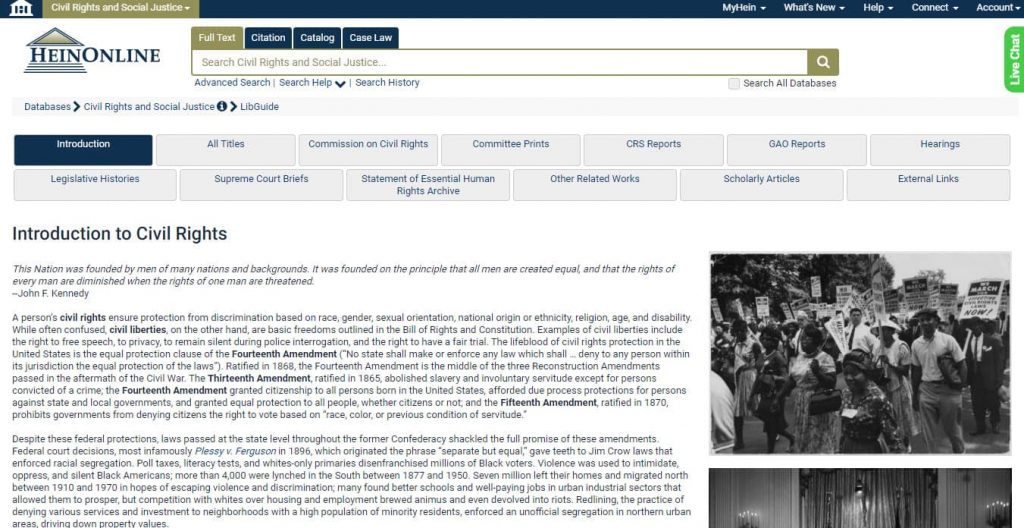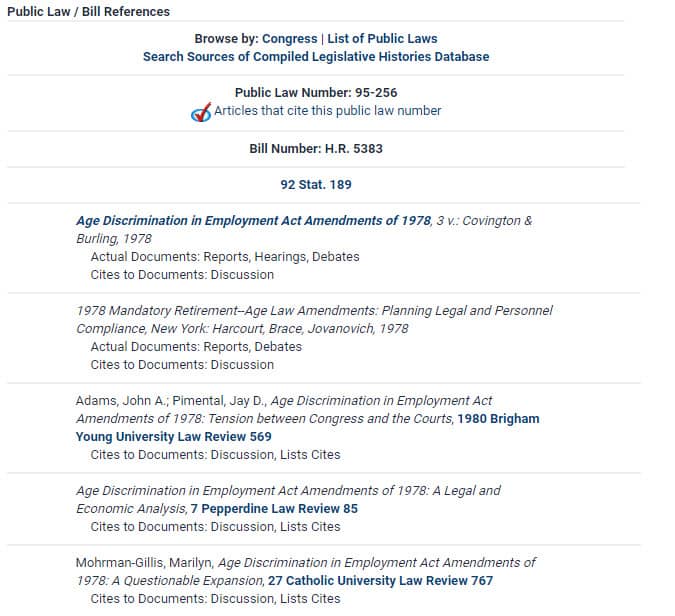In the midst of Black Lives Matter protests, and what some are calling the next civil rights movement, HeinOnline is pleased to offer a new database, Civil Rights and Social Justice. This database brings together a diverse offering of publications covering civil rights in the United States, as their legal protections and definitions are expanded to cover more and more Americans. Civil Rights and Social Justice is included free of charge to all U.S. and international Core subscribers and to the libraries of any other interested organization or institution. Check out a brief overview of the database in the video below.
Introduction to the Database
A person’s civil rights ensure protection from discrimination based on race, gender, sexual orientation, national origin or ethnicity, religion, age, and disability. While often confused, civil liberties, on the other hand, are basic freedoms outlined in the Bill of Rights and Constitution. The lifeblood of civil rights protections in the United States is the Equal Protection Clause of the Fourteenth Amendment. Ratified in 1868, the Fourteenth Amendment is the middle of the three Reconstruction Amendments passed in the aftermath of the Civil War. The Thirteenth Amendment, ratified in 1865, abolished slavery and involuntary servitude except for persons convicted of a crime; the Fourteenth Amendment granted citizenship to all persons born in the United States, afforded due process protections for persons against state and local governments, and granted equal protection to all people, whether citizens or not; and the Fifteenth Amendment, ratified in 1870, prohibits governments from denying citizens the right to vote based on “race, color, or previous condition of servitude.”
Despite these federal protections, laws passed at the state level throughout the former Confederacy shackled the full promise of these amendments. Federal court decisions, most infamously Plessy v. Ferguson in 1896, which originated the phrase “separate but equal,” gave teeth to Jim Crow laws that enforced racial segregation. Poll taxes, literacy tests, and whites-only primaries disenfranchised millions of Black voters.
These and similar discriminatory policies fermented in America for decades leading up to the Civil Rights Movement of the 1960s. In 1954, the Supreme Court ruled unanimously in Brown v. Board of Education that racial segregation in public schools violated the Equal Protection Clause of the Fourteenth Amendment. Following this came the murder of 14-year-old Emmett Till, the arrests of Claudette Colvin and Rosa Parks, the Freedom Rides of 1961, Martin Luther King Jr.’s March on Washington, and many more catalyst events. Finally, the Civil Rights Act of 1964, initially proposed by President John F. Kennedy in June of 1963, was signed into law by President Johnson on July 2, 1964. The other major piece of legislation passed through the efforts of the Civil Rights Movement is the Voting Rights Act of 1965, which enforced the Fourteenth and Fifteenth Amendments by prohibiting any jurisdiction from implementing voting prerequisites that discriminate on the basis of race, color, or language.
However, the struggle for equality did not end with the Civil Rights Movement of the 1960s. The Black Power Movement of the 1960s and 1970s continued advocating for the empowerment of Black people through racial pride, self-sufficiency, and political and cultural institutions. In 1990, another landmark piece of civil rights legislation was passed—the Americans with Disabilities Act. In June of 2020, the Supreme Court ruled in Bostock v. Clayton County that Title VII of the Civil Rights Act protects employees against discrimination on the basis of sexual orientation and gender identity, the first such federal protections for LGBTQ employees. Today, the Black Lives Matter movement protests police brutality and racism, and advocates for economic, social, and political equality for Black people.
This database will help users learn how far our nation has come in fulfilling its promise of “all men are created equal” and how much further it still can go.
What’s Included
Users can browse and search through a wide variety of documents that highlight civil rights and social justice. Let’s take a look at what is available in this database.

Commission on Civil Rights
This subcollection includes more than 650 titles from the United States Commission on Civil Rights, a bipartisan, independent commission of the United States federal government that is responsible for investigating, reporting on, and making recommendations concerning civil rights issues in the United States.
Noteworthy titles include:
- Annotated Bibliography on Selected Fair Housing Issues (1986).
- Fulfilling the Letter and the Spirit of the Law: Desegregation of the Nation’s Public Schools: A Report of the U.S. Commission on Civil Rights (1976).
- One Nation under God, Indivisible, with Liberty and Justice for All: An Abridgment of the Report of the United States Commission on Civil Rights (1959).
- Targeted Fines and Fees against Low-Income Communities of Color: Civil Rights and Constitutional Implications (2017).
Government Documents
Research this topic with committee prints and nearly 1,000 hearings on civil rights issues from a variety of congressional committees. Browse the content by Title, Author, Date, or Subject. Use the Advanced Search option to restrict search results to show only committee prints or only hearings (or both!)
Find a dedicated tab for reports from the Congressional Research Service, a public policy research institute of the United States Congress that forms sound policies based on analysis and research. A dedicated subcollection is also available for the General Accounting Office, a legislative branch agency that provides auditing, evaluation, and investigative services for the U.S. Congress.
Legislation and Supreme Court Briefs
Learn about the process that went into passing civil rights legislation and their various evolving pieces with our curated list of nearly 50 legislative histories. Click the more information icon listed next to any legislation to view its public law number, a link to its Statutes at Large citation, as well as links to articles related to the legislation.

View an extensive listing of nearly 200 Supreme Court Briefs, courtesy of Preview of United States Supreme Court Cases. Noteworthy briefs include:
- Brief for American-Arab Anti-Discrimination Committee and Other Organizations Supporting Civil Rights for American Muslims in Support of Petitioner
- Brief for Former Officials of the U.S. Department of Justice Who Enforced the Voting Rights Act in Support of Appellees
- Brief for NAACP Legal Defense & Educational Fund, Inc. in Support of Respondent Edith Schlain Windsor
Other Related Workds
Access scholarly articles curated by HeinOnline editors on civil rights issues. Users can sort the list by Article Title, Author, Most-Cited, Year (Newest First), or Year (Oldest First). In order to gain access to a given article, users must subscribe to a HeinOnline Core package.
Discover nearly 1,500 books, reports, and publications on a variety of civil rights issues. Take your research even further with resources outside of HeinOnline with provided links to prominent civil rights organizations and pages with supplemental historical information.
For more information about the database, or for help navigating and browsing the content, check out our dedicated LibGuide.
Social Justice Suite
Free of charge to HeinOnline Core subscribers and any interested organizations.
To honor our core value of corporate citizenship, Hein offers three of its databases free of charge to its core American and international subscribers, and to the libraries of any other interested organizations or institutions. This Social Justice Suite consists of the following resources:
- Slavery in America and the World: History, Culture and Law
- Gun Regulation and Legislation in America
- Civil Rights and Social Justice
Registering for free access to any one of these databases will provide complimentary access to the entire suite. We hope that in making these materials accessible to all, we can help foster knowledge, facilitate civil discourse, and encourage action for the betterment of our nation.



